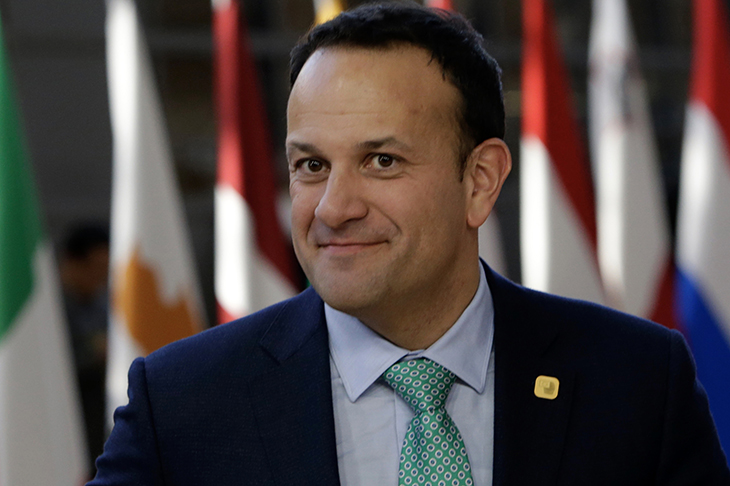The relationship between the UK and the Republic of Ireland has ‘reached a hunger-strike low’, says a new study by an academic from Trinity College, Dublin. ‘Relations have not been as tense since the early 1980s and political rhetoric that had vanished by the 1990s has re-emerged,’ the paper grimly concludes.
The fragility of relations between Britain and Ireland is hard-wired into me. Having grown up ‘London-Irish’ in the 1970s and 1980s, all I ever wanted was for the two countries that define my ethnicity to get on.
The Maze Prison hunger strikes of 1981 and subsequent Republican bombings in London and Brighton — where, lest we forget, the British prime minister was almost assassinated — were intensely distressing for this bookish, news-obsessed Catholic boy.
By the early 1990s, I’d learned to handle the name-calling and argue my corner, but as the ‘mainland operation’ ramped up, so did the anguish. That’s why the 1998 Good Friday Agreement and subsequent Anglo-Irish rapprochement means so much — not just to those in Northern Ireland freed from the threat of daily violence, but to millions of exiles like me, Irish people born and raised elsewhere in the UK.
I don’t need an academic study to tell me Brexit threatens all that. As someone who physically embodies the binding blood and cultural ties between Britain and Ireland, I’m regularly attacked in the Irish media for having voted to leave.
I understand, to my fingertips, that Brexit is a serious irritation in the land of my fathers. The UK accounts for €1 billion of Irish trade each week. Around half of the Republic’s beef, timber and construction material exports are sold in the UK. More than two-thirds of exported goods use Britain as a ‘land bridge’, crossing the Irish Sea, then traveling by road before leaving southern and eastern UK ports, headed for the EU and global markets.
So Brexit poses risks for Ireland, particularly if a no-deal outcome causes logistical complications. There’s a gnawing sense in the Republic that, despite recently improved relations after centuries of oppression, this small country is once again about to suffer from the seemingly thoughtless actions of its bigger neighbor.
Having said that, since taking office in June 2017, Taoiseach Leo Varadkar has overplayed his hand, teaming up with Brussels to adopt a maximalist, ultra-legalistic approach to the Irish border. I’ve made this point a number of times, including in this magazine, so I suppose I’m part of the reason Adrian O’Neill, the Irish ambassador to London, last week wrote to The Spectator to complain of ‘anti-Irish sentiment’. He has, after all, used the letters page to criticize my coverage before.
But it’s not anti-Irish to call out behavior that harms not only Britain but also Ireland. The significant UK-Irish trading relationship means Ireland has much to gain, more than any EU 27 country in relative terms, from a UK-EU free trade agreement. Yet by robotically asserting the ‘impossibility of avoiding a hard border after Brexit’, Varadkar has made a no-deal exit more likely, acting against his country’s economic interests.
If the issue of the Irish backstop had been resolved, as it easily could have been, the UK would have left the EU at the end of last month. It’s wrong to say the House of Commons has never agreed on Brexit: on January 29, Members of Parliament passed the Brady amendment to the withdrawal agreement, supporting Theresa May’s deal on condition the backstop was replaced by ‘alternative arrangements’ to deal with the Irish border.
Such arrangements are entirely achievable, yet the EU, with staunch backing from Dublin, has refused to tweak the withdrawal agreement to placate fears that Britain might never escape the backstop, remaining locked in the customs union with no say over the rules.
Had such latitude been shown, the British government would not now be falling apart, with the UK facing deeply divisive European elections and even a second referendum. Business and investors would be spared months, possibly years, of further crippling uncertainty.
I accept that sectarian sensitivities remain very real with regard to the Irish border. They could easily be inflamed if, post-Brexit, new customs posts or other new infrastructure appear on what has, in recent years, thankfully become an almost invisible frontier. The existing largely virtual border already copes with different currencies, excise duties, VAT rates, income and corporation tax. There is no reason why minor trading rule variations can’t also be managed, variations which would be even smaller if the UK and EU got beyond this backstop nonsense and negotiated a free trade agreement.
Jon Thompson, chief executive of HMRC, has repeatedly said there is no requirement for physical infrastructure between Ireland and Northern Ireland under any circumstances — even if Britain leaves the customs union. Lars Karlsson, former director of the World Customs Organization, authored a report for the European Parliament saying the same. Another leading Dutch customs specialist recently told parliament the argument behind the backstop is ‘fictitious’, in testimony that was barely reported.
In August 2017, the UK government published a paper proposing that the relatively small amount of trade across the Irish border — important to local communities, but barely 1 per cent of the Republic’s exports — could be handled using authorized economic operator schemes and ‘behind the border’ checks, with no new border infrastructure. These proposals were welcomed by Irish foreign minister Simon Coveney, who ‘agreed with the vast majority of them’ as they used ‘a lot of the language that the Irish government has been using’.
Around the same time, Niall Cody, the head of the Irish tax authorities, said he was ‘practically 100 percent certain’ no new customs posts would be necessary along the border, agreeing with the UK position. Then, of course, the Irish government did an about-turn. Varadkar rejected the collaborative approach of his predecessor, Enda Kenny, whom he replaced just as Theresa May lost her Commons majority and became reliant on the DUP. Dublin and Brussels saw a chance to derail Brexit, to mutual benefit. Varadkar got to ‘bash the Brits’, stoking up nationalist sentiment to bolster his weak minority government. And the EU could use Anglo-Irish sensitivities, playing on the UK fear of rekindling the Troubles, to lock Britain in a customs union — ensuring the continued flow of billions of pounds from London into Brussels coffers.
To recount these events, and note that Dublin’s behavior has been not just unhelpful but cynical, unneighborly and dishonest, isn’t anti-Irish. It is to recognize Ireland’s true economic interest and to point out, as someone who knows, just how fragile Anglo-Irish relations are.
This article was originally published in The Spectator magazine.


















